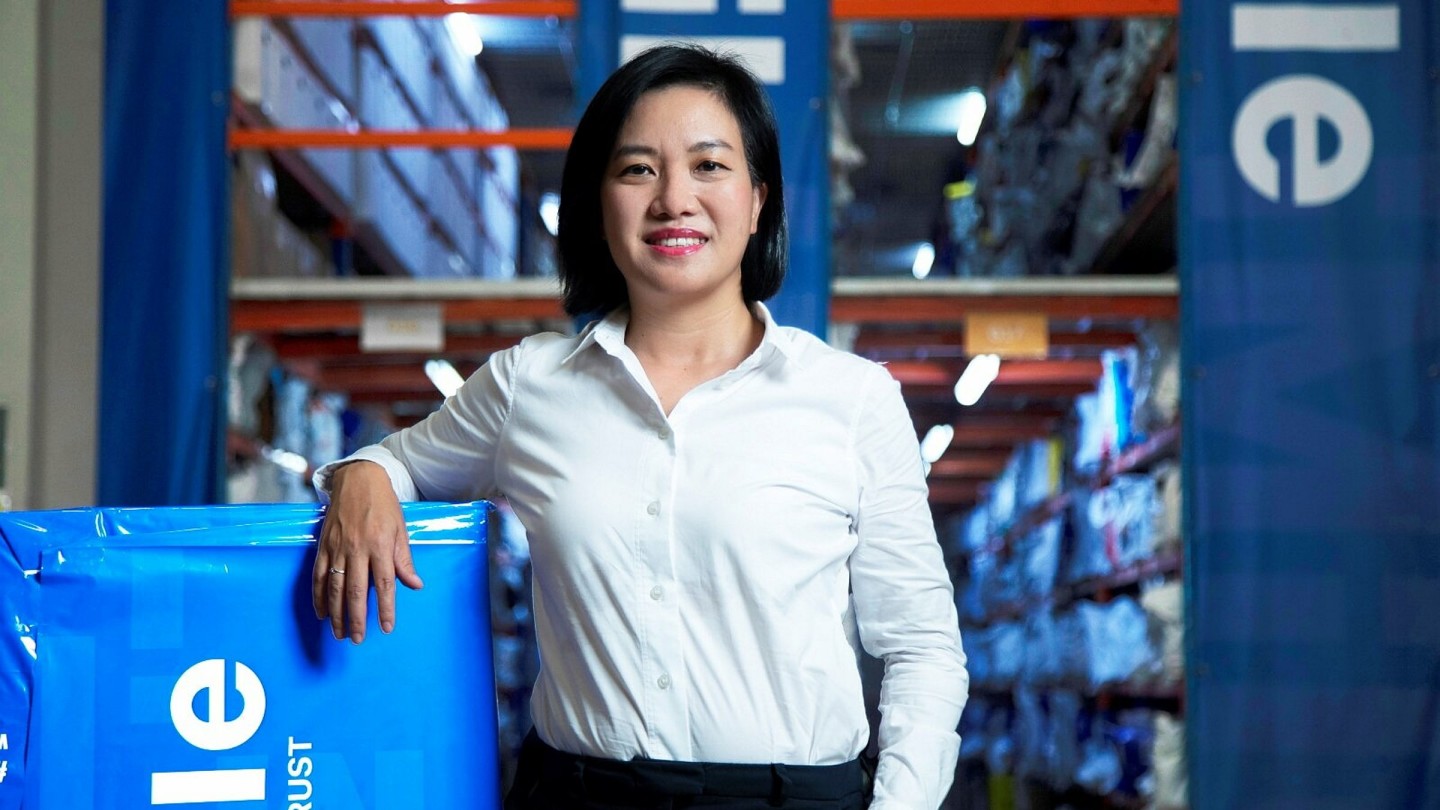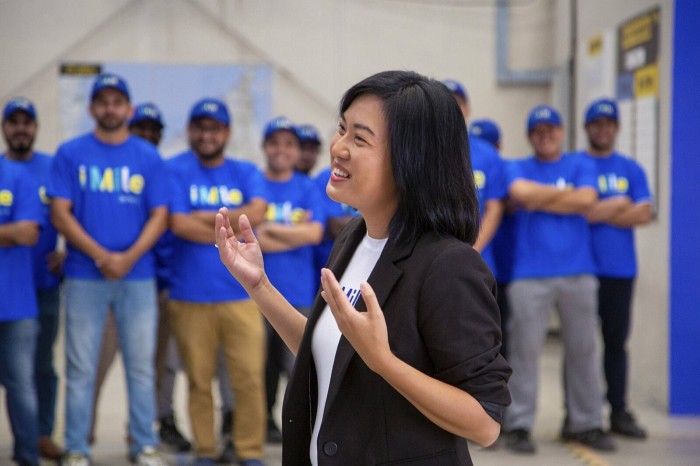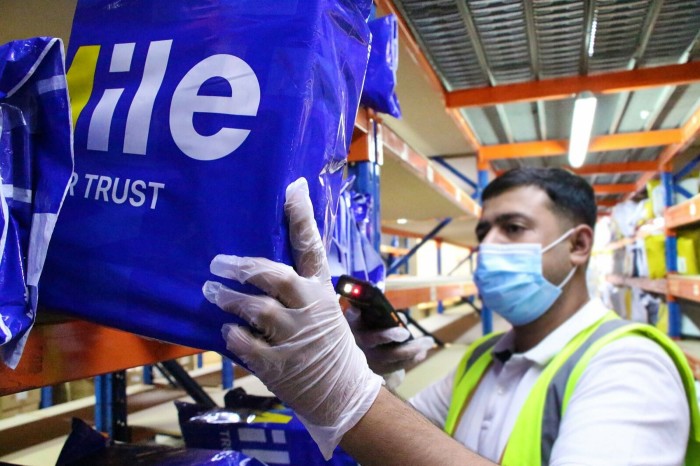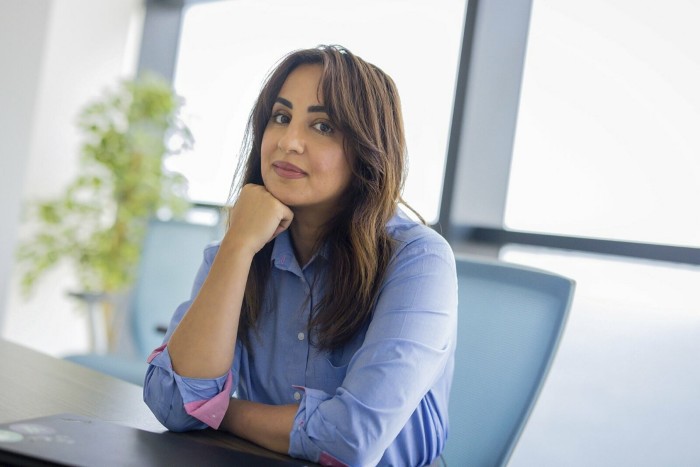Breaking the glass ceiling in the Middle East

Roula Khalaf, Editor of the FT, selects her favourite stories in this weekly newsletter.
In a dusty, unassuming industrial park on the fringes of glitzy Dubai, Rita Huang is quietly building a last-mile delivery firm that she says is on the verge of becoming the region’s first female-founded unicorn — a start-up valued at more than $1bn.
iMile, which boasts TikTok as one of its investors, has rapidly grown since its formation in 2017, tripled revenues since last November and is now looking to close a Series B funding, drawing on major Chinese investors.
Under the guidance of Huang, a Dubai-based Chinese expatriate, the delivery company relies on in-house technology to take on legacy logistics operators.
Known as a tenacious, determined operator, Huang stands apart in the regional start-up space: a Chinese national running a disruptive business in the patriarchal Middle East, where women are only beginning to take on leadership roles in business and government.
But she has always been treated “equally” and, as one of an estimated 200,000 Chinese living in the UAE, she says Dubai’s cosmopolitan, meritocratic milieu was an ideal location to build an enterprise.
“The number one question I get asked is how I am treated as a woman CEO in this region of the world — in China women and men are treated equally and it is no different for me in the Middle East, I am happy to say,” she explains.

There are only a handful of unicorns in the Arab world, most notable among them Careem, the ride-hailing app acquired by Uber in 2019. Most, like elsewhere in the world, are founded and run by men.
MAGNiTT, a start-up data platform, found that, between 2014 and 2020, only 2 per cent of regional start-ups were set up by women, with another 2 per cent co-founded by men and women, while 96 per cent were founded just by men. In 2018, 11 per cent of regional funding went to firms with at least one female founder, roughly similar to the 12 per cent on average in the US that year.
Huang grew up on Hainan island in China and was the first woman in her family to attend university, graduating from an elite institution in biomedical engineering. After working for telecommunications giant Huawei, she came to the Middle East when Alibaba headhunted her for the role of chief technology officer for a Dubai joint venture, where she helped build the region’s first public cloud computing centre.
While working for the Chinese ecommerce giant, she realised that inefficient deliveries were hampering the development of digital sales and the lack of formal postal addresses created problems for retailers. Huang, who had coded for firms in China and sold digital products across the Middle East, reckoned she could do better by using technology to solve the problem.
In 2017, she decided to follow in the footsteps of many other Chinese women and set up her own business: she left Alibaba and founded iMile, a company that would link Chinese manufacturers with the growing legions of online customers in the Middle East.
iMile uses customised warehousing, digitised fleet management and artificial intelligence-powered routing optimisation to cure the delivery ills that bedevil residents across the region, including Dubai, the futuristic commercial centre. Technology also allows the firm to use fewer call centre agents. And some 98 per cent of this technology is developed in-house by 120 full-time China-based engineers.
The surge in online shopping during the pandemic supercharged her business and now Huang reckons she would have a “competitive advantage” in a possible global recession thanks to iMile’s partnerships with cost-effective Chinese manufacturers that want to reach customers directly through ecommerce. She says this direct-to-consumer business model is driving the sector globally, driven by direct deliveries from China.
iMile, which raised $40mn in its Series A funding round last November, is now on a second round and the ultimate plan is to go for an initial public offering sometime in the future.
However, there are still a myriad of issues facing entrepreneurs in the Gulf. They include varying regulatory regimes across the six‑member grouping of Gulf states as well as the multifarious business set-up and licensing costs that are needed to build the necessary scale for emerging start-ups to challenge incumbents. iMile has now expanded into 11 countries including Latin America, with operations in Mexico and Chile, as well as Turkey and Morocco nearer to its home base.

Women, especially nationals, have for decades faced resistance in the conservative Gulf, where families often put pressure on mothers to stay at home to raise their children. While social attitudes are changing, with women entering the workforce and being selected for senior government positions, residual attitudes of this patriarchal system remain. And, of course, there is the age-old question of work-life balance — a problem magnified for those leading fast-growing start-ups.
Huang, who is married with three children below the age of nine, says: “There are lots of sacrifices, but it was my decision — no one pushed me into it — and I tell them we have a different life. I don’t get all the time I want with them, but this is the life I chose.”
The growing start-up culture in Dubai, the region’s established commercial and financial centre, is reflected across the oil-rich region, where governments are keen to encourage entrepreneurialism to create new jobs and help diversify their economies away from a dependence on hydrocarbons.
Saudi Arabia, the region’s largest economy, is undergoing an economic and social transformation driven by the ambitious, young crown prince, Mohammed bin Salman, who has shaken up the kingdom. His agenda has been widely welcomed by the nation’s youth, though conservatives remain sceptical about the rapid social changes and the new social freedoms that have been accompanied by clampdowns on free speech plus other repression.
The combination of social openness, female empowerment and economic reform has, nonetheless, opened more space for female entrepreneurs.
The resultant opportunities are not only being exploited by expatriates such as Huang; nationals are also flooding the start-up space. One of these pioneers, Mounira Jamjoom, followed a traditional path for many Saudi women, becoming a teacher after attending university.
Working as a special needs educator 15 years ago was a world apart from today’s Saudi Arabia, where, since the rise of Prince Mohammed, changes have included ending the ban on women driving. There has also been a wholesale increase in female employment across the economy, even if these changes have been accompanied by arrests of the female activists who had campaigned for such freedoms.
The unemployment rate among Saudi women has decreased from 32 per cent three years ago to 20 per cent in the first quarter of this year.

Further education, including a doctorate from Oxford university, appeared to offer Jamjoom a future in academia, but she went into consultancy, focusing on public sector development and setting up a think-tank on education.
Hired by the government in 2014 to set up an education regulator, she quickly realised that the vast sums of money being ploughed into consultancy companies only created strategies on paper — with little capability to deliver change on the ground.
Setting up her own consultancy, Emkan, allowed Jamjoom to implement projects that deliver change on the educational front-line — such as bringing foreign investment into the domestic education sector and introducing art and culture to the curriculum for the first time.
“I never planned to be an entrepreneur — I always wanted to be in education,” she says. “But I wanted to solve problems in education — and that led me to entrepreneurship, with a passion and mission to improve the sector.”
While considering how to scale up, Jamjoom realised that technology could provide an answer in the shape of online learning platforms. In 2019, she co-founded Aanaab, a digital professional development platform for Arabic-speaking teachers, of which there are an estimated 3mn working in 140,000 schools in the wider Middle East.
This “edtech” company develops courses and content for the classroom in a bid to upscale the workforce. Some 130,000 teachers have signed up so far — a number that is increasing by 700 a week. “We want to be a human resources department for the schools in the region,” Jamjoom says. Fees are either paid by teachers, schools or the government.
She believes the transformation of Saudi society over the past five years has delivered a 180-degree turnround in opportunity for women and youth.
“Now, today, as a business owner, you are respected and treated equally — yes, we need more female businesses to be funded by venture capital, but this is a global challenge and we are part of that.”
Women, who have long outperformed men in higher education, are now a rapidly expanding segment of the workforce. Yet elements of the so-called guardianship model, in which males control aspects of their female relatives’ freedom of movement, remain in place.

Before the recent freedoms were enacted, Jamjoom’s life, earlier in her career, was much more difficult in the conservative kingdom.
“It wasn’t the Saudi of today — you needed to be three times as competitive as any male to succeed,” she says. “I was in meetings where you couldn’t even sit at the table with governors — I had to sit next door and communicate via CCTV, without them even seeing me — that made it hard to get across what I wanted to say.”
“It was very challenging back then, from a social perspective,” she adds. “Being an entrepreneur in a very conservative sector, as well as having to compete with international firms such as EY and PwC while being female was very challenging to get contracts.”
Jamjoom says the government is supportive of female entrepreneurs and she, in turn, regards the educational reform component of the myriad development plans as key to unlocking the kingdom’s true potential. The country needs to overhaul its education system to boost early education and then create a culture of life-long learning to boost national economic productivity, she argues.
Only a quarter of Saudis are in early education, such as kindergarten, whereas the global average is 80 per cent.
The higher education sector has made faster progress than primary and secondary schooling, Jamjoom says. The basic education challenge is “massive”, with 30,000 government schools, 670,000 teachers; including administrators, the education sector workforce totals around 1m. Bringing in external expertise and injecting changes from the private sector are some of the answers being considered.
In the meantime, developing teacher capacity via her online platform helps build the foundations of the sector from the bottom up. She says, “If you have got a good teacher, you have a good system.”
This article is part of FT Wealth, a section providing in-depth coverage of philanthropy, entrepreneurs, family offices, as well as alternative and impact investment
Comments